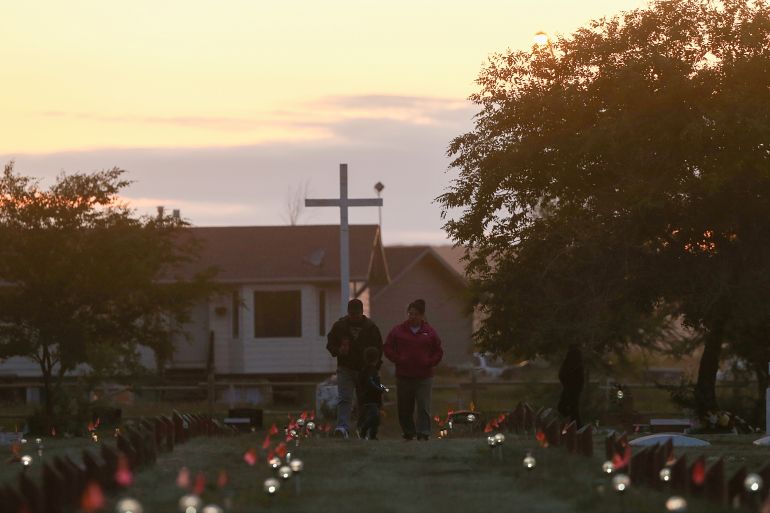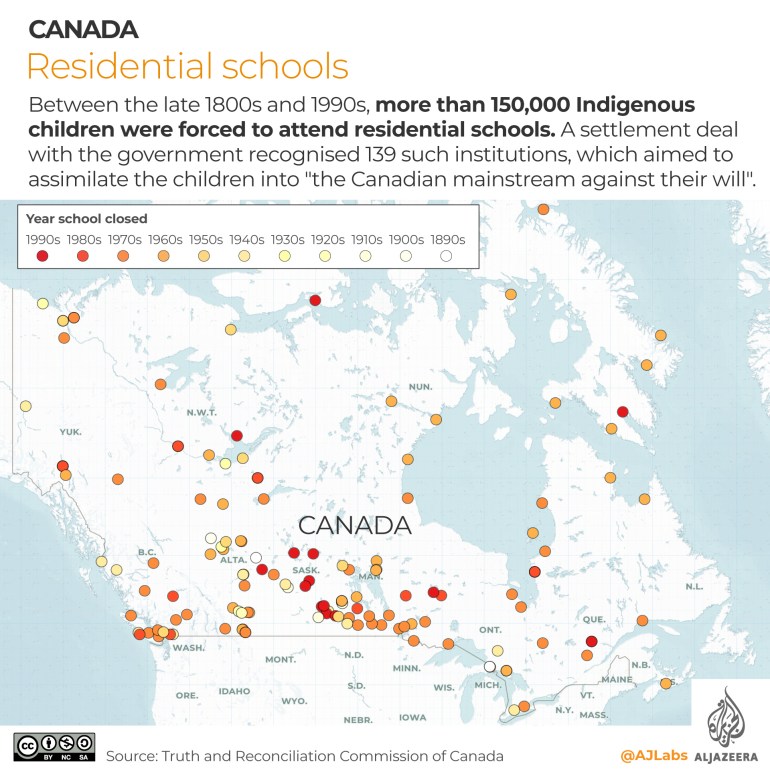More unmarked residential school graves discovered in Canada
Penelakut Tribe in British Columbia says it found more than 160 unmarked graves in latest such discovery since May.

Warning: The story below contains details of residential schools that may be upsetting. Canada’s Indian Residential School Survivors and Family Crisis Line is available 24 hours a day at 1-866-925-4419.
More than 160 “undocumented and unmarked graves” have been discovered at the site of a former residential school on Canada’s west coast, an Indigenous community has announced, as the number of graves linked to the forced-assimilation institutions continues to rise.
Keep reading
list of 4 itemsCan families of Canada’s missing Indigenous children get justice?
Canada: 182 unmarked graves found at another residential school
The path to accountability for Canada’s residential school graves
The Penelakut Tribe said in a statement shared on social media that the graves were found in their territory, where the Kuper Island Industrial School operated between 1890 and 1975.
“It is impossible to get over acts of genocide and human rights violations. Healing is an ongoing process, and sometimes it goes well, and sometimes we lose more people because the burden is too great,” reads the statement from the tribe, located in the Southern Gulf Islands between Vancouver Island and mainland British Columbia.
“We are at another point in time where we must face the trauma because of these acts of genocide. Each time we do, it is possible to heal a little more. Courage is not the absence of fear, courage is acting in spite of fear,” it continued.
The graves are the latest in a string of similar recent discoveries at former residential schools across Canada, which created the institutions as part of an effort to erase Indigenous culture and forcibly assimilate First Nations, Metis and Inuit children.
More than 150,000 Indigenous children were forced to attend the institutions between the late 1800s and the 1990s. They were prevented from speaking their languages and practising their beliefs, separated from their siblings, and suffered widespread physical, psychological and sexual abuse. Several thousand are believed to have died.
Preliminary investigations – often carried out using ground-penetrating radar technology – have uncovered unmarked graves in the provinces of British Columbia, Manitoba and Saskatchewan since late May, prompting calls for accountability both from the Canadian government and the Roman Catholic Church that ran day-to-day operations at most of the institutions.
A federal commission of inquiry dubbed the Truth and Reconciliation Commission in 2015 concluded that Canada had committed “cultural genocide” through its residential school system, and released a series of Calls to Action to address historic and ongoing harms.
Principal among them is for Ottawa to sufficiently fund and provide support to Indigenous communities in their search for unmarked graves at the sites.

Indigenous communities, which have been reeling since the first discovery of 215 Indigenous children’s remains at the Kamloops Indian Residential School in British Columbia in late May, are also calling on the Catholic Church to release all its records related to residential schools.
Other Indigenous community leaders have demanded that criminal charges be laid against the federal government, the church, as well as any individual abusers who are still alive.
Canada formally apologised for residential schools in 2008.
But Indigenous advocates say the government has failed to implement most of the Truth and Reconciliation Commission’s Calls to Action, and they also say current policies continue to disproportionately harm Indigenous children in Canada.
The Indian Residential School Survivors Society, a BC non-profit organisation that supports residential school survivors, said it is important to “learn, understand and acknowledge” why the numbers are significant.
“It is not about sensationalizing this history but shaping current events so we all can heal,” the group tweeted on Tuesday.
It is important to learn, understand and acknowledge why these 'numbers' are significant. It is not about sensationalizing this history but shaping current events so we all can heal; not to overlook, normalize or silence these little children any longer but to bring them home. 🧡
— IRSSS (@IRSSurvivor) July 13, 2021